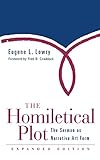 Eugene Lowry writes in The Homiletical Plot that when one of our problems is placed next to the Gospel a sermon emerges. Thus we can approach this in two ways. We can either approach it from the problem and see what aspects of the Gospel address this problem, or we can approach it from the Gospel and ask what questions does this particular Aspect of the Gospel address.
Eugene Lowry writes in The Homiletical Plot that when one of our problems is placed next to the Gospel a sermon emerges. Thus we can approach this in two ways. We can either approach it from the problem and see what aspects of the Gospel address this problem, or we can approach it from the Gospel and ask what questions does this particular Aspect of the Gospel address.
 Lowry demonstrates this by looking at the Trinity. He states that if one wishes to preach on the trinity one can ask, “What problem or bind does the Trinity get us out of?” Likewise we can take a particular problem and then ask how does the Trinity address this issue? It is interesting to see some theologians taking issues like racism or ecology and then asking how the Godhead addresses such issues. Sally McFague structures her ecology theology on the trinity. Nancy Eisland takes disability as her problem and then asks the question what does Jesus have to say to that problem.
Lowry demonstrates this by looking at the Trinity. He states that if one wishes to preach on the trinity one can ask, “What problem or bind does the Trinity get us out of?” Likewise we can take a particular problem and then ask how does the Trinity address this issue? It is interesting to see some theologians taking issues like racism or ecology and then asking how the Godhead addresses such issues. Sally McFague structures her ecology theology on the trinity. Nancy Eisland takes disability as her problem and then asks the question what does Jesus have to say to that problem.

Our Job is to relate the Gospel to the People
As preachers are job is to relate the Gospel to the people. Like every other kind of preacher there are resources unique to us for this undertaking. So I would ask, can we take a problem like Ecology and Address it with the tools that we have for understanding the Gospel? How does the health message relate to ecology? Does it? How about Racism? does the vision of equality in the Sabbath help us address this perinial problem even among our own ranks? (I have written a seminary paper on this, if you want it email me). While these are all academic problems, we could also ask more practical problems like what does Adventism have to say to the one in your congregation that has just lost a loved one? What does Advnetism have to say to one in your congregation that is struggling with Addiction? And finally what does Adventism have to say to systemic structures of evil in the world? Do we only deal with individuals?
What Problems do our Doctrines Address?
But also looking at it from the other side, what problems do our doctrines really address? For example, one might conclude that the Sanctuary message is solely about calculating the 2300 days to prove that we really weren’t wrong on the date 1844. That was truly a question 150 years ago, but does the doctrine have anything to say to us today? I think it does, but remember Lowry pushing us to ask the question what problem is truly address by that doctrine? What bind does it get us out of?
These questions are part of the reason that I began this weblog. I want to begin asking questions of Adventism that we normally do not ask. I also wish to give Adventism a chance to answer…
 of the methodology of the survey, the statistics are very intresting. for example of those members who read Ellen White daily 85% stated that they had a strong relationship with Jesus Christ while 59% of those who do not read her stated this. 82% of those who read Ellen White regularly also have daily Bible study while only 47% of those who do not read her had daily study.
of the methodology of the survey, the statistics are very intresting. for example of those members who read Ellen White daily 85% stated that they had a strong relationship with Jesus Christ while 59% of those who do not read her stated this. 82% of those who read Ellen White regularly also have daily Bible study while only 47% of those who do not read her had daily study.
 the things that you have done wrong. But are these assumptions true?
the things that you have done wrong. But are these assumptions true?

